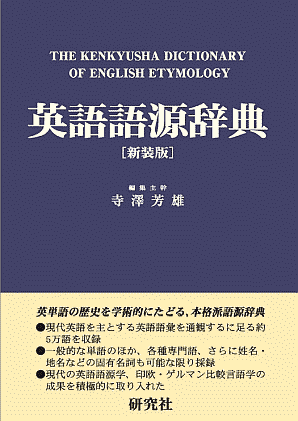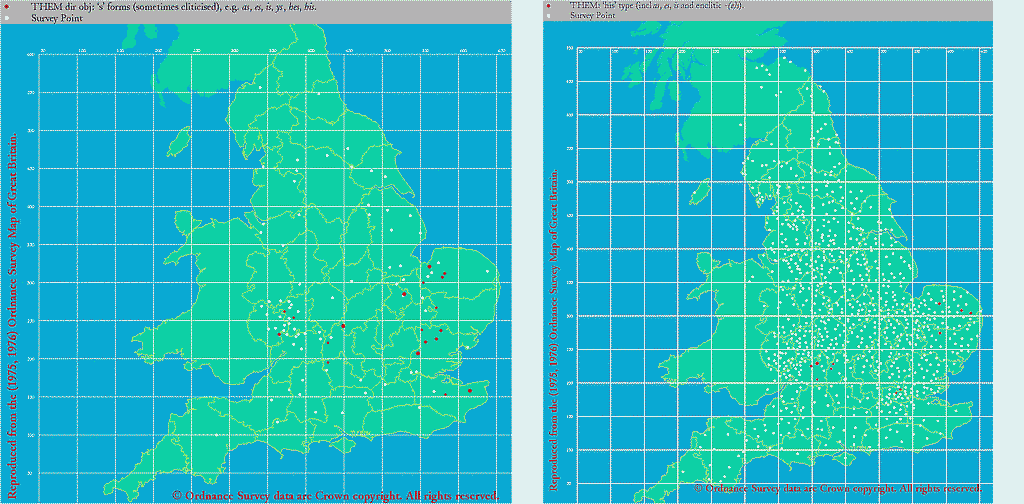2026-02-14 Sat
■ #6137. 古英語の sc の口蓋化・歯擦化 (3) [metathesis][oe][palatalisation][sound_change][phonetics][consonant][digraph][dutch][german]
古英語で sc で表わされる音は典型的には /ʃ/ とされる.前段階の /sk/ が口蓋化 (palatalisation) と歯擦音化を起こしたものと説明されるのが一般的である.しかし,単語によってはこの音変化を経ず,/sk/ にとどまっているものもあれば,両音のあいだで揺れを示すものもある./sk/ にとどまったものは,音位転換 (metathesis) により /ks/ を示すものもあり,単語によっては複雑な異形態を示すことになる.これらの問題について,以下の記事を中心に議論してきた.
・ 「#60. 音位転換 ( metathesis )」 ([2009-06-27-1])
・ 「#1511. 古英語期の sc の口蓋化・歯擦化」 ([2013-06-16-1])
・ 「#5626. 古英語の sc の口蓋化・歯擦化 (2)」 ([2024-09-21-1])
今回は,この問題について Lass (58--59) の知見を新たに加えてみたい.
A different sort of palatalization contributes further to the new series: a change of */sk/ > /ʃ/. The mechanics are not clear, but one reasonable suggestion would be something like [sk] > [sc] > [sç], with a later 'compromise' articulation /ʃ/ emerging from the back-to-back alveolar and palatal. Or, the [k] may have weakened first to [x], as in modern Dutch, without palatalizing; in this case we could see at least three of the stages mirrored in modern Germanic, in the verbs meaning 'to write': Swedish skriva /skri:va/ representing the original, Dutch schrijven /sxrɛivə(n)/ a further development, and German schreiben /ʃraebən/ the final stage (cf. English shrive).
The reason for this palatalization is obscure; it occurs in both front and back environments, and before consonants, so it is not obviously assimilatory like the ones discussed above. The OE spelling <sh> for instance appears to represent /ʃ/ not only in scīnan 'shine' (cf. OIc skína), sc(i)eran 'shear' (OIc skera), but also in scofl 'shovel' (OSw skofl), scanca 'shank' (Dutch skank), scūr 'shower' (Go skūra).
There is however occasional failure in back environments, as shown by the spelling <x> = /ks/, which is due to metathesis (/sk/ > /ks/), in places where <sc> would be expected. This must have occurred while the cluster was still /sk/. Palatalized and nonpalatalized variants of one lexeme may even occur in the same text: the poem Andreas has for 'fish' (Go fisks) both gen sg fisces and dat pl fixum. Failures of palatalization (or dialectal variants: see below) also lead to doublets in later periods, even including ModE: hence ask (OE āscian, ācsian), now frequently with the nonstandard doublet ax (which was the norm in many pre-modern standard varieties). Another example is tusk (OE tūsc, pl tūscas, tūcas), where the nonpalatalized form has come down in most standard varieties, but there are so many dialects with tush.
音位転換形という間接的証拠により,口蓋化が起こっていない形態があることを推定できるというのがおもしろい.異形態 (variants) は,多くの文献学的問題について貴重な資料である.
・ Lass, Roger. Old English: A Historical Linguistic Companion. Cambridge: CUP, 1994.
2024-12-08 Sun
■ #5704. 朝カルシリーズ講座の第8回「英語,オランダ語と交流する」をマインドマップ化してみました [asacul][oe][dutch][mindmap][notice][kdee][etymology][hel_education][lexicology][vocabulary][heldio][link]
11月30日に,今年度の朝日カルチャーセンター新宿教室でのシリーズ講座の第8回が開講されました.今回は「英語,オランダ語と交流する」と題して,英語史ではあまり注目されることのないオランダ語との言語接触について論じました.企画時には90分の講義に値するテーマかどうか自問していましたが,資料を準備する段になって,それが杞憂であることがわかりました.対面およびオンラインで,多くの方々にご参加いただき,ありがとうございました.
講座の内容を,markmap というウェブツールによりマインドマップ化して整理してみました(画像としてはこちらからどうぞ).受講された方は復習用に,そうでない方は講座内容を垣間見る機会としてご活用ください.
今回のシリーズ第8回については hellog と heldio の過去回でも取り上げていますので,ご参照ください.
・ hellog 「#5689. 11月30日(土)の朝カルのシリーズ講座第8回「英語,オランダ語と交流する」のご案内」 ([2024-11-23-1])
・ heldio 「#1277. 11月30日(土)の朝カル講座「英語,オランダ語と交流する」に向けて」 (2024/11/27)
また,シリーズ過去回のマインドマップについては,以下もご参照ください.
・ 「#5625. 朝カルシリーズ講座の第1回「英語語源辞典を楽しむ」をマインドマップ化してみました」 ([2024-09-20-1])
・ 「#5629. 朝カルシリーズ講座の第2回「英語語彙の歴史を概観する」をマインドマップ化してみました」 ([2024-09-24-1])
・ 「#5631. 朝カルシリーズ講座の第3回「英単語と「グリムの法則」」をマインドマップ化してみました」 ([2024-09-26-1])
・ 「#5639. 朝カルシリーズ講座の第4回「現代の英語に残る古英語の痕跡」をマインドマップ化してみました」 ([2024-10-04-1])
・ 「#5646. 朝カルシリーズ講座の第5回「英語,ラテン語と出会う」をマインドマップ化してみました」 ([2024-10-11-1])
・ 「#5650. 朝カルシリーズ講座の第6回「英語,ヴァイキングの言語と交わる」をマインドマップ化してみました」 ([2024-10-15-1])
・ 「#5669. 朝カルシリーズ講座の第7回「英語,フランス語に侵される」をマインドマップ化してみました」 ([2024-11-03-1])
次回の朝カル講座は.12月21日(土)17:30--19:00に開講予定です.第9回「英語,ラテン・ギリシア語に憧れる」と題して,主に初期近代英語期の古典語からの語彙借用に注目します.ご関心のある方は,朝日カルチャーセンター新宿教室の「語源辞典でたどる英語史」のページよりお申し込みください.
・ 寺澤 芳雄(編集主幹) 『英語語源辞典』新装版 研究社,2024年.
2024-12-03 Tue
■ #5699. 20世紀初頭には消えかかっていた royal we [register][royal_we][monarch][lmode][dutch][personal_pronoun][pronoun][register]
Poutsma (878) に,1人称複数代名詞の特別な用法として royal_we の話題が取り上げられている.ただし,術語としては "Plural of Majesty or Plural of Dignity" が用いられている.
As in Dutch, the plural of the first person is sometimes used by sovereigns, especially in public utterances, when speaking of themselves.
About this Plural of Majesty or Plural of Dignity, as it is commonly called, Sweet (N. E. Gr., §2095) observes: "We see the beginnings of this usage in Old-English laws, where the king speaks of himself as iċ, and then goes on to say wē bebēodath .. 'we command ..', the wē being meant to include the witan or councillors." Compare also Kellner, Hist. Outl. of Eng. Synt., §276; Onions, Advanced Eng. Synt., §221.
We were not born to sue, but to command. Rich. II, ii, 1, 196.
Fair and noble hostess, | We are your guest to-night. Macb., I, 6, 24.
Should our host murder us on this spot --- us, his king and his kinsman, ...our fate will be little lightened, but, on the contrary greatly aggravatated, by your stirring, Scott, Quent. Durw., Ch. XXVII, 354.
The Queen said ...: "We are this day fortunate --- we enjoy the company of our amiable hostess at an unusual hour. Id., Abbot, Ch. XXI, 225.
Note. This practice seems to have become unusual or extinct in the personal utterances of sovereigns to their audiences, having been preserved only in public instruments.
Thus King George V in his reply to the address of the Corporation of Bombay uses I, etc.:
You have rightly said that I am no stranger among you [etc.]. Times, No. 1823, 974b.
Similarly in his Address on the occasion of the opening of the Coronation Durbar:
It is with genuine feelings of thankfulness and satisfaction that I stand here to-day among you [etc.]. Id., No. 1824, 1001d.
But in the instrument announcing the fact that the seat of the Government of India will be transferred from Calcutta to Delhi, we find we, etc.: We are pleased to announce to Our People [etc.]. Ib.
20世紀初頭までに royal we は事実上消えていたことが確認できる.使われることがあるにせよ,公的法律文書における伝統的な用法としてであり,レジスターはきわめて限定されていたことがわかる.
・ Poutsma, H. A Grammar of Late Modern English. Part II, The Parts of Speech, 1B. Groningen: P. Noordhoff, 1916.
2024-11-23 Sat
■ #5689. 11月30日(土)の朝カルのシリーズ講座第8回「英語,オランダ語と交流する」のご案内 [asacul][notice][kdee][etymology][hel_education][helkatsu][link][lexicology][vocabulary][dutch][afrikaans][flemish][borrowing][loan_word][contact][germanic][japanese][historiography][voicy][heldio]

・ 日時:11月30日(土) 17:30--19:00
・ 場所:朝日カルチャーセンター新宿教室
・ 形式:対面・オンラインのハイブリッド形式(1週間の見逃し配信あり)
・ お申し込み:朝日カルチャーセンターウェブサイトより
今年度の朝カルシリーズ講座「語源辞典でたどる英語史」が,月に一度のペースで順調に進んでいます.主に『英語語源辞典』(研究社)を参照しながら,英語語彙史をたどっていくシリーズです.
1週間後に開講される第8回ではオランダ語と英語の言語接触に迫ります.後期中英語期には,イングランドはオランダを含む低地帯 (the Low Countries) との商業的な交流が盛んで,言語的にも濃い接触があったと考えられています.しかし,伝統的な英語史記述においては,オランダ語との言語接触は,ラテン語,フランス語,古ノルド語などとの言語接触に比べて注目度が低く,大々的に話題にされることはほとんどありません.重要なオランダ借用語をいくつか挙げて終わり,ということが一般的です.しかし,オランダ語の英語への影響は潜在的には一般に考えられている以上に大きく,講座1回分の議論の価値は十分にあると思われます.
今回の講座では,ゲルマン語派におけるオランダ語(および関連諸言語・方言)の位置づけを確認しつつ,同言語が英語の語彙やその他の部門に与えた影響について議論します.また,背景としての英蘭関係史にも注目します.さらに,オランダ単語が日本語語彙に多く入り込んでいる事実にも注目したいと思います.
本シリーズ講座の各回は独立していますので,過去回への参加・不参加にかかわらず,今回からご参加いただくこともできます.過去7回分については,各々概要をマインドマップにまとめていますので,以下の記事をご覧ください.
・ 「#5625. 朝カルシリーズ講座の第1回「英語語源辞典を楽しむ」をマインドマップ化してみました」 ([2024-09-20-1])
・ 「#5629. 朝カルシリーズ講座の第2回「英語語彙の歴史を概観する」をマインドマップ化してみました」 ([2024-09-24-1])
・ 「#5631. 朝カルシリーズ講座の第3回「英単語と「グリムの法則」」をマインドマップ化してみました」 ([2024-09-26-1])
・ 「#5639. 朝カルシリーズ講座の第4回「現代の英語に残る古英語の痕跡」をマインドマップ化してみました」 ([2024-10-04-1])
・ 「#5646. 朝カルシリーズ講座の第5回「英語,ラテン語と出会う」をマインドマップ化してみました」 ([2024-10-11-1])
・ 「#5650. 朝カルシリーズ講座の第6回「英語,ヴァイキングの言語と交わる」をマインドマップ化してみました」 ([2024-10-15-1])
・ 「#5669. 朝カルシリーズ講座の第7回「英語,フランス語に侵される」をマインドマップ化してみました」 ([2024-11-03-1])
本講座の詳細とお申し込みはこちらよりどうぞ.『英語語源辞典』(研究社)をお持ちの方は,ぜひ傍らに置きつつ受講いただければと存じます(関連資料を配付しますので,辞典がなくとも受講には問題ありません).

(以下,後記:2024/11/27(Wed))
・ 寺澤 芳雄(編集主幹) 『英語語源辞典』新装版 研究社,2024年.
2024-11-17 Sun
■ #5683. 英語本来語かオランダ借用語かの判定が難しい理由 [dutch][low_german][flemish][contact][lexicology][borrowing][loan_word][germanic][old_norse][evidence]
昨日の記事「#5682. Low Dutch という略称」 ([2024-11-16-1]) で,オランダ語やそれと関連する言語変種からの語彙借用の話題に触れた.過去の記事でも,同じ関心から「#4445. なぜ英語史において低地諸語からの影響が過小評価されてきたのか?」 ([2021-06-28-1]) などで議論してきた.
英語とオランダ語はともに西ゲルマン語派の低地ドイツ語群に属しており,単語もよく似ている.したがって,ある英単語が歴史的に英語本来語なのかオランダ借用語なのかを確信をもって判定するのは,しばしば困難である.この困難の背景について,Durkin (356) がもう少し丁寧に解説しているので,引用したい.
Normally such certainty is only available in cases where the absence of an English sound change or the presence of a Dutch or Low German one demonstrates borrowing: the situation is similar to that explored with reference to early Scandinavian borrowings . . . , with the added complication that there are fewer sound changes distinguishing English from Dutch and Low German. The same problem even affects some words first attested much later than the Middle English period, especially those found in regional varieties for which earlier evidence is in very short supply.
英語本来語かオランダ借用語か否かの判定において,音変化の有無の対比といった言語内的な証拠に訴えかけられるチャンスが低いという点が悩ましい.この点で古ノルド借用語の判定にかかわる困難とも比較されるが,古ノルド語の場合には,北ゲルマン語派に属する言語なので,もう少し言語内的な差異に頼ることができるのだろう.
また,現存する歴史的証拠が乏しい地域変種における語彙となると,さらに判定が困難になるというのもうなずける.個々の単語について,言語内的な証拠だけでなく言語外的な証拠をも収集し,厳密に考慮していかなければならない所以である.
・ Durkin, Philip. Borrowed Words: A History of Loanwords in English. Oxford: OUP, 2014.
2024-11-16 Sat
■ #5682. Low Dutch という略称 [dutch][low_german][flemish][contact][lexicology][borrowing][loan_word][terminology][germanic][variety]
「#2646. オランダ借用語に関する統計」 ([2016-07-25-1]) で,英語史におけるオランダ借用語をめぐって Durkin を参照した.そこで Dutch でも Low German でもなく,中間的な Low Dutch という用語が使われていた.これが何を指すのかといえば,Durkin 自身が丁寧に解説してくれていた.その1節 (354) を読んでみよう.
Loanwords into English from Dutch (including Flemish) and Low German are normally considered together, because it is so difficult to tell them apart. This is partly because word forms in both languages were, and to some extent still are, so similar, and partly because the social and cultural circumstances of borrowing into English are also often hard to tell apart. 'Low Dutch' is sometimes used as a collective cover term for borrowings from either or both languages into English, although it is important to note that Low Dutch is not itself a language name, but simply a terminological shorthand for referring to a complex situation.
Dutch と Low German は各々区別される言語変種ではあるが,単語の形態が互いによく似ており,借用元同定の文脈においては,実際上区別がつかないことも多いために,便宜上2変種を合わせた用語として Low Dutch を設定しておく,ということだ.ある意味で Low Dutch はフィクションということになる.フランス借用語かラテン借用語か判別がつきにくいときに,便宜上「フランス・ラテン系借用語」などと一括して呼ぶのに似ている.
しかし,こうした用語のフィクション性それ自体も程度の問題ともいえるかもしれない.というのは,上記の Dutch にしても Low German にしても,「区別される言語変種」と一応のところ述べはしたが,やはり何らかの程度においてフィクションでもあるからだ.この点については「#415. All linguistic varieties are fictions」 ([2010-06-16-1]) を参照.
便利に使えるのであれば Low Dutch というタームは悪くない.
・ Durkin, Philip. Borrowed Words: A History of Loanwords in English. Oxford: OUP, 2014.
2024-11-12 Tue
■ #5678. 日本語に入ったオランダ語の単語 (2) [dutch][japanese][loan_word][lexicology][contrastive_language_history][contact]
「#5675. 日本語に入ったオランダ語の単語」 ([2024-11-09-1]) の続編.オランダ語から日本語へ借用された語はまだまだある.前回と重複する単語もあるが,以下,2つの文献より例を加えたい.まず,沖森 (548) より.
【医科学関係】アルコール,エキス,オブラート,ガス,カテーテル,カリ,カルキ,コレラ,チフス,ハトロン,メス,レトルト,レンズ
【物品名ほか】インキ,ガラス,コーヒー,コック,コップ,ゴム,スコップ,ブリキ,ビール,ピント,ペンキ,ホース,ポンプ,マドロス
続けて,佐藤 (179--80) からも追加する.
【医学・薬学関係】エーテル (ether)・オブラート (oblaat)・エキス (extract)・カルシウム (calcium)・カンフル (kamfer, kampher)・コレラ (cholera)・ペスト (pest)・メス (mes)・モルヒネ (morphine)
【化学・物理・天文】テレスコープ (telescoop)・レンズ (lens)・ピント (brandpunt)・コンパス (kompas)・アルカリ (alkali)・アルコール (alcohol)・ソーダ (soda)・エレキテル (eletriciteit)
【生活関係】コーヒ (kofij)・ビール (bier)・シロップ (siroop)・コップ (kop)・ギヤマン (diamant)・ゴム (gom)・ブリキ (blik)・ペン (pen)・ペンキ (pek)・ポンプ (pomp)・ランプ (lamp)・ズック (doek)・チョッキ (jak)・ホック (hoek)
【軍事関係】サーベル (sabel)・ピストル (pistool)・ランドセル (ransel)
主に明治時代以降に日本語に借用された英単語と事実上同形のものも散見されるが,以上のものはオランダ語からの借用であることに留意したい.
・ 沖森 卓也 『日本語全史』 筑摩書房〈ちくま新書〉,2017年.
・ 佐藤 武義(編著) 『展望 現代の日本語』 白帝社,1996年.
2024-11-09 Sat
■ #5675. 日本語に入ったオランダ語の単語 [dutch][japanese][loan_word][lexicology][contrastive_language_history][contact]
近年の研究で,英語史におけるオランダ語 (dutch) の位置づけが少し変わってきていることについては,以下の記事で取り上げてきた.
・ 「#3435. 英語史において低地諸語からの影響は過小評価されてきた」 ([2018-09-22-1])
・ 「#4444. オランダ借用語の絶頂期は15世紀」 ([2021-06-27-1])
・ 「#4445. なぜ英語史において低地諸語からの影響が過小評価されてきたのか?」 ([2021-06-28-1])
・ 「#4446. 低地諸語が英語に及ぼした語彙以外の影響 --- 南部方言の TH-stopping と当中部方言の3単現のゼロ」 ([2021-06-29-1])
オランダ語との言語接触といえば,英語史のみならず日本語史でも重要なテーマである.日本語におけるオランダ借用語について,まず『日本語百科大事典』を開いてみた.その1027ページに「江戸時代の洋語」と題する1節があり,そこでオランダ語からの借用語が扱われている.そちらを読んでみよう.
江戸時代に入った洋語はほとんどすべてオランダ語である.長崎におけるオランダ人との貿易による,貿易に関連した用語および江戸後期に芽生え,幕末にいたってさかんになった蘭学に起因する科学技術の用語である.
貿易に関連した用語には,たとえば,
インデン(Indië,革製品)・ズック(doek)・ボートル(boter,バター)・ガラス(glas)・キルク(kurk)・コップ(kop)・ブリキ(blik)・ランプ(lamp)
などがある.蘭学関係の用語としては,
オブラート(oblaat)・メス(mes,外科用具)・カルキ(kalk)・キナ(kina,マラリアの薬)・サフラン(saffraan,薬草)・ヨジウム(jodium)・アルカリ(alkali)・アルコール(alcohol)・エレキテル(electriciteit)・タルモメートル(thermometer)・レンズ(lens)
などがある.
工業技術関係では,
ダライバン(draaibank,旋盤)・バイト(beitel,刃具)・ポンプ(pomp)・カラン(kraan,給水管のコック)
などがある.
これらのオランダ語系洋語の中には明治以後消失したものもあるが,かなり多くの語が現在まで続けて使われている.
日英語の対照言語史 (contrastive_language_history) という観点からも,オランダ語との言語接触はもっと注目されてよいトピックではないだろうか.
・ 『日本語百科大事典』 金田一 春彦ほか 編,大修館,1988年.
2024-03-09 Sat
■ #5430. 行為者接尾辞 -er は本来は動詞ではなく名詞の基体についた [analogy][reanalysis][agentive_suffix][suffix][morphology][word_formation][dutch][german]
-er は典型的な行為者接尾辞 (agentive_suffix) の1つである.一般に動詞の基体に付加することで,対応する行為者の名詞を作る接尾辞としてとらえられている.
しかし,この接尾辞は,本来は名詞の基体について「~に関係する人」ほどを意味する行為者名詞を作るものだった.例えば fisher (漁師)は,動詞 fish に -er がついたものと思われるかもしれないが,語源的には名詞 fish に -er がついたものなのである.
『英語語源辞典』の -er1 によると,もともとは名詞にのみ付加された接尾辞が,まず弱変化動詞にもつくようになり,さらに強変化動詞にもつくようになったという.なぜ接尾辞の適用範囲が動詞にも拡がったかといえば,まさに上に挙げた fish のような名詞と動詞を兼ねた基体が橋渡しとなり,再分析 (reanalysis) を促したのだろうと考えられる.
Fertig (35) が,この種の再分析の例として,まさに -er を取り上げている.
An even more striking example is the English/German/Dutch agentive suffix -er (< proto-Germanic *-ārjo-z). Originally, this suffix could only be attached to nouns to produce new nouns with the meaning 'person having something to do with X' (where X is the meaning of the base noun). This use can still be seen in Modern English words such as hatter and is highly productive with place names, e.g. English New Yorker; Dutch Amsterdammer; German Pariser, etc. In the older languages, we see this original use clearly in examples such as Gothic bôkareis/Old English bócere 'scribe', derived from the noun corresponding to Modern English book. As this example suggests, the construction was used especially to designate professions and occupations, and there was very often also a related denominal verb. In Gothic, for example, we find the basic noun dôm- 'judgment', the derived verb dômjan 'to judge' and the noun dômareis 'judge (i.e. person who judges)'. Nouns like dômareis were then reanalyzed as being derived from the verbs rather than directly from the basic nouns.
この接尾辞については,hellog でも多く取り上げてきた.以下の記事などを参照.
・ 「#1748. -er or -or」 ([2014-02-08-1])
・ 「#3791. 行為者接尾辞 -er, -ster はラテン語に由来する?」 ([2019-09-13-1])
・ 「#5392. 中英語の姓と職業名」 ([2024-01-31-1])
・ Fertig, David. Analogy and Morphological Change. Edinburgh: Edinburgh UP, 2013.
2023-05-22 Mon
■ #5138. 句比較の発達と言語接触 [comparison][adjective][suffix][superlative][contact][synthesis_to_analysis][latin][french][grammaticalisation][german][dutch][french_influence_on_grammar]
形容詞・副詞の比較級・最上級の作り方には, -er/-est 語尾を付す形態的な方法と more/most を前置する統語的な方法がある.それぞれを「屈折比較」と「句比較」と呼んでおこう.これについては,hellog,heldio,その他でも様々に紹介してきた.「#4834. 比較級・最上級の歴史」 ([2022-07-22-1]) に関連リンクをまとめているので参照されたい.
英語やロマンス諸語の歴史では,屈折比較から句比較への変化が生じてきた.印欧語族に一般に観察される「総合から分析へ」 (synthesis_to_analysis) の潮流に沿った事例として見られることが多い.この変化は,比較構文の成立という観点からは文法化 (grammaticalisation) の1例ともとらえられる.
今回は Heine and Kuteva による言語接触に関わる議論を紹介したい.英語やいくつかの言語において歴史的に句比較が発達した1要因として,ロマンス諸語との言語接触が関係しているのではないかという仮説だ.英語がフランス語やラテン語の影響のもとに句比較を発達させたという仮説自体は古くからあり,上記のリンク先でも論じてきた通りである.Heine and Kuteva は,英語のみならず他の言語においても言語接触の効果が疑われるとし,言語接触が決定的な要因だったとは言わずとも "an accelerating factor" (96) と考えることは可能であると述べている.英語を含めて4つの事例が挙げられている (96) .
a. Analytic forms were still rare in Northern English in the fifteenth century, while in Southern English, which was more strongly exposed to French influence, these forms had become current at least a century earlier . . . .
b. In German, the synthetic comparative construction is still well established, e.g. schön 'beautiful', schön-er ('beautiful-COMP') 'more beautiful'. But in the dialect of Luxembourg, which has a history of centuries of intense contact with French, instances of an analytic comparative can be found, e.g. mehr schön ('more beautiful', presumably on the model of French plus beau ('more beautiful') . . . .
c. The Dutch varieties spoken in Flanders, including Algemeen Nederlands, have been massively influenced by French, and this influence has also had the effect that the analytic pattern with the particle meer 'more' is used increasingly on the model of French plus, at the expense of the inherited synthetic construction using the comparative suffix -er . . . .
d. Molisean has a 500-years history of intense contact with the host language Italian, and one of the results of contact was that the speakers of Molisean have given up the conventional Slavic synthetic construction by replicating the analytic Italian construction, using veče on the model of Italian più 'more' as degree marker. Thus, while Standard Croatian uses the synthetic form lyepši 'more beautiful', Molisean has più lip ('more beautiful') instead . . . .
このようなケースでは,句発達の発達は,言語接触によって必ずしも推進 ("propel") されたとは言えないものの,加速 ("accelerate") したとは言えるのではないか,というのが Heine and Kuteva の見解である.
・ Heine, Bernd and Tania Kuteva. "Contact and Grammaticalization." Chapter 4 of The Handbook of Language Contact. Ed. Raymond Hickey. 2010. Malden, MA: Wiley-Blackwell, 2013. 86--107.
2023-02-28 Tue
■ #5055. 英語史における言語接触 --- 厳選8点(+3点) [contact][loan_word][borrowing][latin][celtic][old_norse][french][dutch][greek][japanese][link]
英語が歴史を通じて多くの言語と接触 (contact) してきたことは,英語史の基本的な知識である.各接触の痕跡は,歴史の途中で消えてしまったものもあるが,現在まで残っているものも多い.痕跡のなかで注目されやすいのは借用語彙だが,文法,発音,書記など語彙以外の部門でも言語接触のインパクトがあり得ることは念頭に置いておきたい.
英語の言語接触の歴史を短く要約するのは至難の業だが,Schneider (334) による厳選8点(時代順に並べられている)が参考になる.
・ continental contacts with Latin, even before the settlement of the British Isles (i.e., roughly between the second and fourth centuries AD);
・ contact with Celts who were the resident population when the Germanic tribes crossed the channel (in the fifth century and thereafter);
・ the impact of Latin through Christianization (beginning in the late sixth and seventh centuries);
・ contact with Scandinavian raiders and later settlers (between the seventh and tenth centuries);
・ the strong exposure to French as the language of political power after 1066;
・ the massive exposure to written Latin during the Renaissance;
・ influences from other European languages beginning in the Early Modern English period; and
・ the impact of colonial contacts and borrowings.
よく選ばれている8点だと思うが,私としてはここに3点ほど付け加えたい.1つは,伝統的な英語史では大きく取り上げられないものの,中英語期以降に長期にわたって継続したオランダ語との接触である.これについては「#4445. なぜ英語史において低地諸語からの影響が過小評価されてきたのか?」 ([2021-06-28-1]) やその関連記事を参照されたい.
2つ目は,上記ではルネサンス期の言語接触としてラテン語(書き言葉)のみが挙げられているが,古典ギリシア語(書き言葉)も考慮したい.ラテン語ほど目立たないのは事実だが,ルネサンス期以降,ギリシア語の英語へのインパクトは大きい.「#516. 直接のギリシア語借用は15世紀から」 ([2010-09-25-1]) および「#4449. ギリシア語の英語語形成へのインパクト」 ([2021-07-02-1]) を参照.
最後に日本語母語話者としてのひいき目であることを認めつつも,主に19世紀後半以降,英語が日本語と意外と濃厚に接触してきた事実を考慮に入れたい.これについては「#126. 7言語による英語への影響の比較」 ([2009-08-31-1]),「#2165. 20世紀後半の借用語ソース」 ([2015-04-01-1]),「#3872. 英語に借用された主な日本語の借用年代」 ([2019-12-03-1]),「#4140. 英語に借用された日本語の「いつ」と「どのくらい」」 ([2020-08-27-1]) を参照.
Schneider の8点に,この3点を加え,私家版の厳選11点の完成!
・ Schneider, Edgar W. "Perspectives on Language Contact." Chapter 13 of English Historical Linguistics: Approaches and Perspectives. Ed. Laurel J. Brinton. Cambridge: CUP, 332--59.
2022-12-15 Thu
■ #4980. 『中高生の基礎英語 in English』の連載第22回「なぜヨーロッパの人は英語が上手なの?」 [notice][sobokunagimon][rensai][indo-european][comparative_linguistics][reconstruction][germanic][italic][french][latin][german][dutch][spanish][italian][heldio]
『中高生の基礎英語 in English』の1月号が発売されました.連載「歴史で謎解き 英語のソボクな疑問」の第22回として「なぜヨーロッパの人は英語が上手なの?」に答えています.

この素朴な疑問は,大雑把でナイーヴな問いに響くかもしれません.ヨーロッパ人がみな英語が上手なわけではありませんし,アジアやアフリカを含めた世界の各地に英語が上手な人はたくさんいます.このことは承知の上で,今回の記事をなるべく多くの中高生に届けたいという思いから,あえてこのような表題を掲げた次第です.
中高生に英語学習の早い段階でぜひとも知ってもらいたい重要なことがあります.それは,英語とヨーロッパの主要言語との関係です.将来大学などに進学して英語以外の言語を学ぶことになったとき,あるいは独学で他言語に挑んでみようと思い立ったとき,もしヨーロッパの諸言語を念頭においているのであれば,ぜひ英語,ドイツ語,オランダ語,フランス語,スペイン語,イタリア語などの相互関係について言語学・言語史的な観点から理解しておいてください.学習言語を選択する上で,とても大事な知識だからです.
大学教員である私は日常的に大学生と付き合っていますが,彼らのなかには,英語史の授業などで英語とヨーロッパの諸言語との関係を初めて知ると,第2外国語として○○語ではなくフランス語/ドイツ語を選択しておけばよかった,などと口にする学生がいます.もう1年か2年早く諸言語間の関係を知っていたら△△語を選んでいたのに,と後悔しているようなのです.
中高生の皆さんは,いずれ英語以外の言語を学ぶ可能性があるのであれば,英語と他の言語との関係について知っていたほうが得です.主体的に学習言語を選択できることになるからです.最終的にどの言語を選ぶにせよ,事前に多くの情報をもっておくに越したことはありません.
英語やヨーロッパの主要言語は,いずれもインドヨーロッパ語族と呼ばれる言語家族の一員です.おおまかにいえば言語が互いに似ているのです.しかし,英語と比較してどの点でどのくらい似ているのか,あるいは似ていないのかは,言語ごとに異なります.
ドイツ語とオランダ語は,英語とともにインドヨーロッパ語族のなかでもゲルマン語派という派閥に属しており,文法や発音において互いに似ているところがあります.しかし,実際にドイツ語やオランダ語に触れてみると,英語と同じ派閥に属しているわりには,それほど似ていないという印象を受けるかもしれません.似ているけれども似ていない,似ていないけれども似ている,といった妙な距離感です.
一方,フランス語,スペイン語,イタリア語などは,長らくヨーロッパの共通語だったラテン語とともにインドヨーロッパ語族のなかでもイタリック語派という派閥に属しています.英語とは大きく異なる派閥なのですが,英語は歴史を通じてフランス語やラテン語から多くの単語を借りてきた経緯があるため,語彙に関しては実は共通しているものが非常に多いのです.したがって,これらの言語を学んでみると,表面的には英語とよく似ているという印象を受けます.
英語は,ゲルマン語派にルーツをもつけれどもイタリック語派の影響を大きく受けながら発展してきた言語なのです.単純化していえば,英語はヨーロッパのいくつかの言語を混ぜ合わせたような混合言語といってよいでしょう.皆さんが英語の次に学ぶ言語を選択する際には,ぜひこのことを参考にしてみてください.
今回の話題と関連する Voicy 「英語の語源が身につくラジオ (heldio)」の放送回としては「#486. 英語と他の主要なヨーロッパ言語との関係 ー 仏西伊葡独語」がお勧めです.ぜひお聴きください.
2022-10-22 Sat
■ #4926. yacht の <ch> [dutch][loan_word][silent_letter][consonant][spelling_pronunciation][metathesis][phoneme][grapheme][spelling_pronunciation_gap][spelling][consonant][phonology][orthography][digraph][eebo]
学生から <ch> が黙字 (silent_letter) となる珍しい英単語が4つあるということを教えてもらった(貴重な情報をありがとう!).drachm /dræm/, fuchsia /ˈfjuːʃə/, schism /sɪzm/, yacht /jɑt/ である.典拠は「#2518. 子音字の黙字」 ([2016-03-19-1]) で取り上げた磯部 (7) である.
今回は4語のうち yacht に注目してみたい.この語は16世紀のオランダ語 jaght(e) を借用したもので,OED によると初例は以下の文である(cf. 「#4444. オランダ借用語の絶頂期は15世紀」 ([2021-06-27-1])).初例で t の子音字がみられないのが気になるところではある.
a1584 S. Borough in R. Hakluyt Princ. Navigations (1589) ii. 330 A barke which was of Dronton, and three or foure Norway yeaghes, belonging to Northbarne.
英語での初期の綴字(おそらく発音も)は,原語の gh の発音をどのようにして取り込むかに揺れがあったらしく,様々だったようだ.OED の解説によると,
Owing to the presence in the Dutch word of the unfamiliar guttural spirant denoted by g(h), the English spellings have been various and erratic; how far they represent varieties of pronunciation it is difficult to say. That a pronunciation /jɔtʃ/ or /jatʃ/, denoted by yatch, once existed seems to be indicated by the plural yatches; it may have been suggested by catch, ketch.
<t> と <ch> が反転した yatch とその複数形の綴字を EEBO で検索してみると,1670年代から1690年代までに50例ほど上がってきた.ちなみに,このような綴字の反転は中英語では珍しくなく,とりわけ "guttural spirant" が関わる場合にはよく見られたので,ある意味ではその癖が初期近代英語期にまではみ出してきた,とみることもできるかもしれない.
yatch の発音と綴字については,Dobson (371) が次のように言及している.
Yawt or yatch 'yacht' are two variant pronunciations which are well evidenced by OED; the former is due to the identification of the Dutch spirant [χ] with ME [χ], of which traces still remained when yacht was adopted in the sixteenth century, so that it was accommodated to the model of, for example, fraught and developed with it, while OED suggests that the latter is due to analogy with catch and ketch---it is certainly due to some sort of corrupt spelling-pronunciation, in the attempt to accommodate the word to native models.
<t> と <ch> の綴字上の反転と,それに続く綴字発音 (spelling_pronunciation) の結果生み出された yacht の妙な異形ということになる.
・ 磯部 薫 「Silent Consonant Letter の分析―特に英語史の観点から見た場合を中心として―」『福岡大学人文論叢』第5巻第1号, 1973年.117--45頁.
・ Dobson, E. J. English Pronunciation 1500--1700. 2nd ed. 2 vols. Oxford: OUP, 1968.
2022-03-09 Wed
■ #4699. 英語のスペリング史と言語接触 [spelling][orthography][contact][loan_word][old_norse][latin][french][dutch][greek][lexicology][historiography]
英語が各時代に接触してきた言語との関係を通じて英語の語彙史を描くことは,英語史のスタンダードの1つである.本ブログでも「#1526. 英語と日本語の語彙史対照表」 ([2013-07-01-1]),「#2615. 英語語彙の世界性」 ([2016-06-24-1]),「#2966. 英語語彙の世界性 (2)」 ([2017-06-10-1]),「#3381. 講座「歴史から学ぶ英単語の語源」」 ([2018-07-30-1]),「#4130. 英語語彙の多様化と拡大の歴史を視覚化した "The OED in two minutes"」 ([2020-08-17-1]) などで繰り返し紹介してきた.
これとおよそ連動はするのだが独立した試みとして,英語が各時代に接触してきた言語との関係を通じて英語のスペリング史を描くこともできる.そして,この試みは必ずしもスタンダードではなく,英語史のなかでの扱いは小さかったといってよい.
英語のスペリング史と言語接触 について Horobin (113) が次のように述べている.
English spelling is a concoction of written forms drawn from a variety of languages through processes of inheritance and borrowing. At every period in its history, the English lexicon contains words inherited from earlier stages, as well as new words introduced from foreign languages. But this distinction should not be applied too straightforwardly, since inherited words have frequently been subjected to changes in their spelling over time. Similarly, while words drawn from foreign language may preserve their native spellings intact, they frequently undergo changes in order to accommodate to native English spelling patterns.
語彙史とスペリング史は,しばしば連動するが,原則とした独立した歴史である,という捉え方だ.これはとても正しい見方だと思う.Horobin は同論考のなかで,英語史の各時代ごとにスペリングに影響を及ぼした言語・方言について次のような見取り図を示している.論考のセクション・タイトルを抜き出す形でまとめてみよう.
[ Old English (650--1066) ]
・ Germanic
・ Old Norse
[ Middle English (1066--1500) ]
・ English dialects beyond London
・ French
・ Dutch
[ Early Modern English (1500--1800) ]
・ Latin
・ Greek
・ Celtic
・ Native American languages
[ Modern English ]
・ Continued developments
スペリング史の見取り図としておもしろい.語彙史とおよそ連動していながらも,やはり視点が若干異なっているのだ.このような英語史の見方は実に新鮮だなと思った次第.
・ Horobin, Simon. "The Etymological Inputs into English Spelling." The Routledge Handbook of the English Writing System. Ed. Vivian Cook and Des Ryan. London: Routledge, 2016. 113--24.
[ 固定リンク | 印刷用ページ ]
2021-07-01 Thu
■ #4448. 中英語のイングランド海岸諸方言の人称代名詞 es はオランダ語からの借用か? [personal_pronoun][me_dialect][dutch][borrowing][clitic]
標題は,「#3701. 中英語の3人称複数対格代名詞 es はオランダ語からの借用か? (1)」 ([2019-06-15-1]) および「#3702. 中英語の3人称複数対格代名詞 es はオランダ語からの借用か? (2)」 ([2019-06-16-1]) で取り上げてきた話題である.
一般にオランダ語が英語に及ぼした文法的影響はほとんどないとされるが,その可能性が疑われる稀な言語項目として,中英語のイングランド海岸諸方言で行なわれていた人称代名詞の es が指摘されている(ほかに「#140. オランダ・フラマン語から借用した指小辞 -kin」 ([2009-09-14-1])も参照).
このオランダ語影響説について,Thomason and Kaufman (323) が興奮気味の口調で紹介し解説しているので,引用しよう.
[T]here was a striking grammatical influence of Low Dutch on ME that is little known, because though introduced sometime before 1150, it is found in certain dialects only and disappeared by the end of the fourteenth century . . . .
In the Lindsey (Grimsby?), Norfolk, Essex, Kent (Canterbury and Shoreham), East Wessex (Southampton?), and West Wessex (Bristol?) dialects of ME, attested from just before 1200 down to at least 1375, there occurs a pronoun form that serves as the enclitic/unstressed object form of SHE and THEY. Its normal written shape is <(h)is> or <(h)es>, presumably /əs/; one text occasionally spells <hise>. This pronoun has no origin in OE. It does have one in Low Dutch, where the unstressed object form for SHE and THEY is /sə/, spelled <se> (this is cognate with High German sie). If the ME <h> was ever pronounced it was no doubt on the analogy of all the other third person pronoun forms of English. We do not know whether Low Dutch speakers settled in sizable numbers in all of the dialect areas where this pronoun occurs, but there is one striking correlation: all these dialect areas abut on the sea . . ., and after 1070 the seas near Britain, along with their ports, were the stomping grounds of the Flemings, Hollanders, and Low German traders. These facts should remove all doubt as to whether this pronoun is foreign or indigenous (and just happened not to show up in any OE texts!).
引用の最後で述べられている通り,「疑いがない」というかなり強い立場が表明されている.p. 325 では "this clear instance of structural borrowing from Low Dutch into Middle English" とも述べられている.仮説としてはとてもおもしろいが,先の私の記事でも触れたように,もう少し慎重に論じる必要があると思われる.West Midland の内陸部でも事例が見つかっており,同説を簡単に支持することはできないからだ.連日引用してきた Hendriks (1668) も,Thomason and Kaufman のこの説には懐疑的な立場を取っており,論題として取り上げていないことを付言しておきたい.
・ Thomason, Sarah Grey and Terrence Kaufman. Language Contact, Creolization, and Genetic Linguistics. Berkeley: U of California P, 1988.
・ Hendriks, Jennifer. "English in Contact: German and Dutch." Chapter 105 of English Historical Linguistics: An International Handbook. 2 vols. Ed. Alexander Bergs and Laurel J. Brinton. Berlin: Mouton de Gruyter, 2012. 1659--70.
2021-06-29 Tue
■ #4446. 低地諸語が英語に及ぼした語彙以外の影響 --- 南部方言の TH-stopping と東中部方言の3単現のゼロ [th][phonetics][dutch][flemish][low_german][contact][me_dialect][dialect_levelling][3sp][aave]
オランダ語を中心とする低地諸語の英語への影響について,連日「#4444. オランダ借用語の絶頂期は15世紀」 ([2021-06-27-1]) と「#4445. なぜ英語史において低地諸語からの影響が過小評価されてきたのか?」 ([2021-06-28-1]) で取り上げてきた.今回は語彙以外への影響について Hendriks の指摘している2点を取り上げよう.
まず1点目は,中英語期,Flemish 話者の影響により,英語の歯摩擦音 [ð] が,対応する閉鎖音 [d] に置き換えられたのではないかという説について.この説の出所である Samuels を参照した Hendriks (1668) によれば,中英語の Kent, East Sussex, East Surrey の方言より,"the" が de として,thick が dykke として,"this" が dis として文証されるという.Samuels の報告によれば,この "TH-stopping" は上記の地域で15世紀初頭までに起こっており,現在でも指示詞に限られるものの,その効果が残っているという.
2点目は,Trudgill の研究で知られるようになった East Midland 方言における3単現のゼロである (cf. 「#2310. 3単現のゼロ」 ([2015-08-24-1])).Trudgill は,この地域で英語と低地諸語が言語接触し,動詞屈折が多様化・複雑化しすぎた結果,最終的に水平化する方向で解決をみた,という議論により現在の3単現のゼロを説明しようとしている.Hendriks (1668) の説明により,この議論のニュアンスをもう少し丁寧に追ってみよう.
In an article first published in 1997, Trudgill (2002) seeks to understand why the present-tense, third person singular verb forms lack -s in the East Anglian dialects. Surviving evidence suggests that from the 11th to the 15th century, Est Anglian dialects had the original -th form, but by 1700, the zero form had become a typical feature of these dialects. Noting a number of zero forms in the early 17th letters of Katherine Paston, he situates the emergence of the zero forms in the 16th century. This time-frame corresponds to massive migration into East Anglia from the Low countries and France as a result of the Dutch Revolt in the southern Netherlands and civil wars in France. Trudgill concludes that the zero from is due to contact at a time when the East Anglian system itself was in flux and this is the key to his argument. There is evidence of variation between the native southern -th forms and the northern -s forms at the same time that this region experience[d] a massive influx of immigrants who would have found the typologically highly marked third person singular verb forms difficult to acquire. In this situation of dialect contact, Trudgill (2002: 185) asserts, "natural forms tend to win out over non-natural ones".
特に後者の「3単現のゼロ」問題は aave の起源論においても鍵となるトピックであり,英語史上きわめて重要な論題である.
・ Hendriks, Jennifer. "English in Contact: German and Dutch." Chapter 105 of English Historical Linguistics: An International Handbook. 2 vols. Ed. Alexander Bergs and Laurel J. Brinton. Berlin: Mouton de Gruyter, 2012. 1659--70.
・ Samuels, Michael L. "Kent and the Low countries: Some Linguistic Evidence." Edinburgh Studies in English and Scots. Ed. A. J. Aitken, Angus McIntosh, and Hermann Pálsson. London: Longman, 1971. 3--19.
・ Trudgill, Peter. "Third-Person Singular Zero: African-American English, Anglian Dialects and Spanish Persecution in the Low Countries." East Anglian English. Ed. Jacek Fisiak and Peter Trudgill. Cambridge: D. S. Brewer, 2002. 179--86.
2021-06-28 Mon
■ #4445. なぜ英語史において低地諸語からの影響が過小評価されてきたのか? [historiography][dutch][flemish][low_german][contact][loan_word][borrowing][purism][register][oed]
昨日の記事「#4444. オランダ借用語の絶頂期は15世紀」 ([2021-06-27-1]) でも触れたように,英語史において低地諸語からの影響は過小評価されてきたきらいがある (cf. 「#3435. 英語史において低地諸語からの影響は過小評価されてきた」 ([2018-09-22-1])).これは英語史記述に関する小さからぬ問題と考えているが,なぜそうだったのだろうか.
Hendriks (1660) によれば,過小評価されてきた理由の1つとして,オランダ語を代表とする低地諸語がいずれも英語と近縁言語であり,個々の単語の語源確定が困難である点を指摘している.積極的にオランダ語由来であると判定できない限り,英語本来語であるという保守的な判断が優先されるのも無理からぬことだ.英語史はまずもって英語の存在を前提とする学問である以上,この点において強気の議論を展開することは難しい.明らかに英語とは異質の語源であると判明しやすいフランス語(そして,ある程度そうである古ノルド語)と比べれば,この点は確かに理解できる.
[C]ontributions from the Scandinavian and French languages to the lexicon of English, for example, are discussed in terms of certainty, whereas contributions from the closely related varieties of "Low Dutch" or "Low German" are couched in terms of "probably" or "possibly" or are simply not discussed.
しかし,それ以上に Hendriks が強調しているのは,従来の英語史の標準的参考書の背景に横たわる "purist language ideologies" (1659) である.Hendriks はさほど過激な物腰で論じていてるわけではないのだが,効果としては伝統的な英語史記述に対する強烈で辛辣な批判となっているといってよい.非常に注目すべき論考だと思う.
Hendriks は議論を2点に絞っている.1つめは,OED の文学テキスト偏重への批判である.OED は伝統的に,中英語における複数言語の混交した "macaronic" なテキストをソースとして除外してきた.実際には,このような実用的で現実的なテキストこそが,まさにオランダ語などからの新語導入の契機を提供していたかもしれないという視点が,OED には認められなかったということである(ただし,目下編纂中の第3版においてはこの点で改善が見られるということは Hendriks (1669) 自身も言及している).
もう1つは上記とも関連するが,OED は現代の標準英語に連なる英語変種にしか焦点を当ててこなかったという指摘だ.オランダ語からの借用語は,むしろ標準英語から逸脱したレジスター,例えば商業分野や通商分野の "macaronic" なレジスターでこそ活躍していたと想定されるが,OED なり英語史の標準的参考書では,そのような非標準的なレジスターはまともに扱われてこなかった.Hendriks (1662) 曰く,
Non-literary sources such as macaronic business writings, however, may be more likely to reflect the vernacular of London than the more pure literary texts selected to compile the atlas. Given the literary emphasis in the OED and the LALME, the range of topics which appear in these sources may be considerably restricted. The consequence of this is that entire semantic fields --- such as those pertaining to industrial or commercial relations, that is, fields where the significant contribution of Low Dutch to the English lexicon would be observed --- remain undocumented.
さらに,近代英語期以降に限れば,OED は "Standard English" 以外のソースを軽視してきたという事実も指摘せざるを得ない.
要するに,オランダ借用語が存在感を示してきたはずのレジスターが,OED を筆頭とする標準的レファレンスのソースには含まれてこなかったということなのだ.これは,英語史の historiography における本質的な問題と言わざるを得ない.
・ Hendriks, Jennifer. "English in Contact: German and Dutch." Chapter 105 of English Historical Linguistics: An International Handbook. 2 vols. Ed. Alexander Bergs and Laurel J. Brinton. Berlin: Mouton de Gruyter, 2012. 1659--70.
2021-06-27 Sun
■ #4444. オランダ借用語の絶頂期は15世紀 [dutch][flemish][low_german][contact][loan_word][borrowing]
たいていの英語史概説書では,Dutch, Flemish, Afrikaans, Low German などの低地帯 (the Low Countries) の諸言語からの借用語について,多少の記述がある.しかし,ラテン語,古ノルド語,フランス語からの借用語と比べれば規模も影響もずっと小さいため,あくまでオマケ的な位置づけにとどまる.
ところが,昨今の英語史研究では,このように過小評価されてきた事実を受けて,低地諸語との言語接触をより積極的に評価しようという気運が高まってきている.
本ブログでは,関連する記事として以下を書いてきた.
・ 「#126. 7言語による英語への影響の比較」 ([2009-08-31-1])
・ 「#140. オランダ・フラマン語から借用した指小辞 -kin」 ([2009-09-14-1])
・ 「#149. フラマン語と英語史」 ([2009-09-23-1])
・ 「#2645. オランダ語から借用された馴染みのある英単語」 ([2016-07-24-1])
・ 「#2646. オランダ借用語に関する統計」 ([2016-07-25-1])
・ 「#3435. 英語史において低地諸語からの影響は過小評価されてきた」 ([2018-09-22-1])
・ 「#3436. イングランドと低地帯との接触の歴史」 ([2018-09-23-1])
今回は,OED を用いて低地諸言語からの借用語("once-Dutch words" と称されている)を調査した den Otter に依拠した Hendriks (1667) より,13--17世紀に英語に入ってきた借用語のサンプルを示そう.
13th century:
asquint, bouse, gewgaw, muster, pack, scour, scum, slight, slip, slop, welter, wiggle
14th century:
bale, bundle, clamp, clock, fraught, grim, groove, keel, kit, mate, miller, north-north-east, north-north-west, rack, rover, school, scoop, slipper, slap, sled, spike, splint, splinter, tear, wainscot, wig, wind
15th century:
brake, cabbage, cooper, cope, cramer, dapper, deck, excise, freight, gold, graft, hackle, hop, leak, lighter, luck, marline, mart, meerkat, misdeal, mud, nappy, pace, peg, pickle, pink, pip, rack, rumple, rutter, scout, scuttle, slip, sod, stripe, stuff, tattle, warble, whirl
16th century:
aloof, anker, beleaguer, boor, boss, bumpkin, burgomaster, bush, cashier, clump, cramp, dike-grave, dock, dollar, domineer, drawl, ensconce, filibuster, flute, foist, forlorn hope, free-booter, frolic, gripe, gruff, jerkin, kermis, landscape, lazy, manikin, mesh, pad, pickle-herring, pram, push, rant, rash, reef, safflower, sconce, scone, scrabble, scrub, shoal, slap, snap, sniff, snuff, snuffle, span, spatter, stake, steady, stump, stutter, tattoo, uproar, wagon, wagoner, yacht
17th century:
back, balk, beer, blaze, boom, brandy, clank, cruise, cruiser, decoy, drill, duck, easel, enlist, etch, furlogh, gas, gherkin, hovel, hustle, kill, kink, knapsack, masterpiece, morass, outlander, plug, polder, skate, sketch, slim, slurp, smack, smuggle, smuggler, snow, snuff, speck, still life, stink-pot, stoker, tea, trigger (den Otter 1990: 265--266)
den Otter の調査によると,集まった "once Dutch words" の数は1254語であり,その影響の絶頂期は15世紀だったという(続いて,16世紀,18世紀,17世紀という順番) (Hendriks 1667) .オランダ借用語というと16--17世紀の海事用語が多そうなイメージだが,実際には日常的な名詞,動詞,形容詞も多数含まれていることがわかる.
・ den Otter, Alice G. "Lekker Scrabbling: Discovery and Exploration of Once-Dutch Words in the Online Oxford English Dictionary." English Studies 71.3 (1990): 261--71.
・ Hendriks, Jennifer. "English in Contact: German and Dutch." Chapter 105 of English Historical Linguistics: An International Handbook. 2 vols. Ed. Alexander Bergs and Laurel J. Brinton. Berlin: Mouton de Gruyter, 2012. 1659--70.
2019-10-13 Sun
■ #3821. Old Saxon からの借用語 [loan_word][borrowing][lexicology][old_saxon][germanic][dutch][flemish][german][oe][germanic]
英語史において,英語と同じ西ゲルマン語群の姉妹言語である Old Saxon の存在感は薄い.しかし,ゼロではない.昨日の記事「#3819. アルフレッド大王によるイングランドの学問衰退の嘆き」 ([2019-10-11-1]) で触れた,アルフレッド大王の教育改革に際して,John という名の古サクソン人が補佐を務めていたという記録がある.また,Genesis B として知られる古英詩には,9世紀の Old Saxon から翻訳された1節が含まれていることも知られている.
Genesis B には,hearra (lord), sima (chain), landscipe (region), heodæg (today) を含む少数の Old Saxon に由来するとおぼしき語が確認される.いずれも後代に受け継がれなかったという点では,英語史上の意義は小さいといわざるを得ない.しかし,必要とあらばありとあらゆる単語を多言語から借りるという,後に発達する英語の雑食的な特徴が,古英語期にすでに現われていたということは銘記しておいてよい (Crystal 27) .
一般に,英語史において「遺伝的」関係が近い西ゲルマン語群からの借用語は多くはない.遺伝的関係が近いのであれば,現実の言語接触も多かったはずではないかと想像されるが,そうでもない.たとえば,(高地)ドイツ語からの借用語は「#2164. 英語史であまり目立たないドイツ語からの借用」 ([2015-03-31-1]),「#2621. ドイツ語の英語への本格的貢献は19世紀から」 ([2016-06-30-1]) でみたように,全体としては目立たない.それなりの規模で英語に影響を与えたといえるのは,オランダ語やフラマン語くらいだろう.これらの低地諸語からの語彙的影響については,「#149. フラマン語と英語史」 ([2009-09-23-1]),「#2645. オランダ語から借用された馴染みのある英単語」 ([2016-07-24-1]),「#2646. オランダ借用語に関する統計」 ([2016-07-25-1]),「#3435. 英語史において低地諸語からの影響は過小評価されてきた」 ([2018-09-22-1]),「#3436. イングランドと低地帯との接触の歴史」 ([2018-09-23-1]) を参照されたい.
・ Crystal, David. The Cambridge Encyclopedia of the English Language. 3rd ed. Cambridge: CUP, 2019.
2019-06-16 Sun
■ #3702. 中英語の3人称複数対格代名詞 es はオランダ語からの借用か? (2) [personal_pronoun][laeme][lalme][me_dialect][clitic][map][dutch]
昨日の記事 ([2019-06-15-1]) に引き続き,中英語の them の代わりに用いられる es という人称代名詞形態について.Bennett and Smithers の注を引用して,およそ "SE or EMidl" に使用が偏っていると述べたが,LAEME と eLALME を用いて,初期・後期中英語における状況を確認しておこう.
LAEME では Map No. 00064420 として "THEM dir obj: 's' forms (sometimes cliticised), e.g. as, es, is, ys, hes, his." が挙げられており(下左図),eLALME では Item 8 として "THEM: 'his' type (incl as, es, is and enclitic -(e)s)." が挙げられている(下右図).ここでは縮小して掲げているので,詳しくはクリックして拡大を.

全体として例が多いわけではないが,中英語期を通じて East Midland と Southeastern を中心として,部分的には内陸の West Midland にも散見されるといった分布を示していることが分かる.
オランダ語との関連を議論するためには,当時のオランダ語話者集団のイングランドへの移民状況などの歴史社会言語学的な背景を調べる必要がある.一般的にいえば,「#3435. 英語史において低地諸語からの影響は過小評価されてきた」 ([2018-09-22-1]) でみたように,14世紀辺りには毛織物貿易の発展によりフランドルと東イングランドの関係は緊密になったことから,East Midland における es や類似形態の分布に関しては,オランダ語影響説を論じ始めることができるかもしれない.しかし,West Midland の散発的な事例については,別に考えなければならないだろう.
・ Bennett, J. A. W. and G. V. Smithers, eds. Early Middle English Verse and Prose. 2nd ed. Oxford: OUP, 1968.
Powered by WinChalow1.0rc4 based on chalow